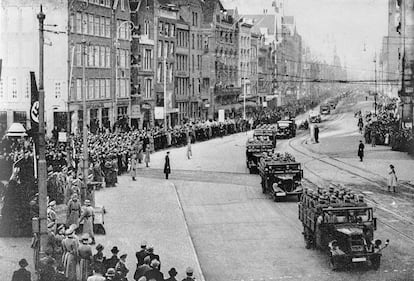The Netherlands spied on Jewish Holocaust survivors, considering them a danger to democracy
An analysis of declassified historical documents shows that members of the Dutch Auschwitz Committee, who were classified as an extremist group, were monitored by the secret service


Until the 1980s, the Dutch Domestic Security Service (BVD) monitored Jewish citizens in Amsterdam who were survivors of the Holocaust, considering them a potential danger to democracy. Those spied on included members of the Dutch Auschwitz Committee, which was founded in 1956 and dedicated to commemorating the liberation of the concentration camp. The secret services classified the organization as extremist, according to declassified documents from the National Archives between 1945 and 1998, analyzed by the Dutch media outlet Het Parool. The military police, in charge of customs, also took part in the espionage, informing on people who participated in trips to Poland, where Auschwitz, the largest Nazi concentration camp, was located.
The documents — a total of 71,000 declassified files — have been accessible to the public since 2022. They reflect the extensive surveillance carried out by the intelligence services. The documents are not redacted, but cannot be copied. The profiles of those spied on range from politicians, journalists and lawyers, to intellectuals, activists, artists and other representatives of civil society in Amsterdam.
The BVD is the predecessor of the current General Intelligence and Security Service (AIVD), which on Saturday issued a statement explaining that Holocaust survivors “were not seen as a threat.” However, an exception was made for those associated with the Dutch Auschwitz Committee, as this was considered “a communist front organization.” The AIVD statement added that it must be remembered that the monitoring took place in the context of the Cold War, and pointed out that several historical studies showed that the committee “was dominated by communists.” At that time, communism was “the great threat to national security.” From the content of a letter dated 1964 accessed by Het Parool, it is clear that the BVD saw the committee as a communist organization.
The Dutch Communist Party itself was also spied on, and some of its members also belonged to the Dutch Auschwitz Committee. “No one ever knew this,” Jacques Grishaver, current chair of the committee, told NOS public television. “These were different times, but the fact that you are going to make a report about Auschwitz commemorations, about the people who came there to remember their family that had been massacred, to embed the BVD there? It defies any idea of civilization. That cannot be justified, not even with time.”
The Dutch secret services had an informant whose testimonies were added to the police lists of travelers, who visited Auschwitz in Poland. One of the issues discussed by the committee, according to the mole’s report, was the release of German chief Willy Lages, who was responsible for the deportation of more than 70,000 Dutch Jews. Lages — who was the head of the city’s Security Service — was sentenced to death for these crimes, but in 1949, it was commuted to life imprisonment. In 1966, he was released from prison, on the grounds that he was reportedly suffering from a terminal illness. At the meeting reported by the BVD infiltrator, “everyone present thought it was scandalous to release a subject who was meant to be in prison,” according to Het Parool. Lages traveled to Germany after his release and died five years later.
Another issue analyzed by the committee, and closely followed by the BVD, was the campaign for compensation for Jewish survivors of the war and their families. In 1973, almost 30 years after World War II, the Netherlands passed a benefits act intended to compensate the victims of Nazi persecution. Of the 140,000 Jews residing in the Netherlands in 1940, only 35,000 remained. Of the 107,000 deported to the extermination camps, 102,000 died. According to the Dutch Auschwitz Committee, 220 members of the Roma and Sinti communities also perished.
In 1947, at least 342 Jewish residents of Amsterdam had to pay taxes on properties they were forced to abandon when they were sent to the concentration camps. In most cases, their homes were confiscated by the Nazis and sold to Dutch collaborators. The facts were uncovered in 2011 by Charlotte van den Berg, an intern who worked on the digitization of municipal archives. Receiving no response from the Amsterdam City Council, she went to Het Parool (founded by the Dutch resistance in 1941) in 2013. The City Council then commissioned a report, made public in 2014, which resulted in a €10 million ($11 million) fund to be distributed among the city’s Jewish community.
Sign up for our weekly newsletter to get more English-language news coverage from EL PAÍS USA Edition
Tu suscripción se está usando en otro dispositivo
¿Quieres añadir otro usuario a tu suscripción?
Si continúas leyendo en este dispositivo, no se podrá leer en el otro.
FlechaTu suscripción se está usando en otro dispositivo y solo puedes acceder a EL PAÍS desde un dispositivo a la vez.
Si quieres compartir tu cuenta, cambia tu suscripción a la modalidad Premium, así podrás añadir otro usuario. Cada uno accederá con su propia cuenta de email, lo que os permitirá personalizar vuestra experiencia en EL PAÍS.
¿Tienes una suscripción de empresa? Accede aquí para contratar más cuentas.
En el caso de no saber quién está usando tu cuenta, te recomendamos cambiar tu contraseña aquí.
Si decides continuar compartiendo tu cuenta, este mensaje se mostrará en tu dispositivo y en el de la otra persona que está usando tu cuenta de forma indefinida, afectando a tu experiencia de lectura. Puedes consultar aquí los términos y condiciones de la suscripción digital.








































